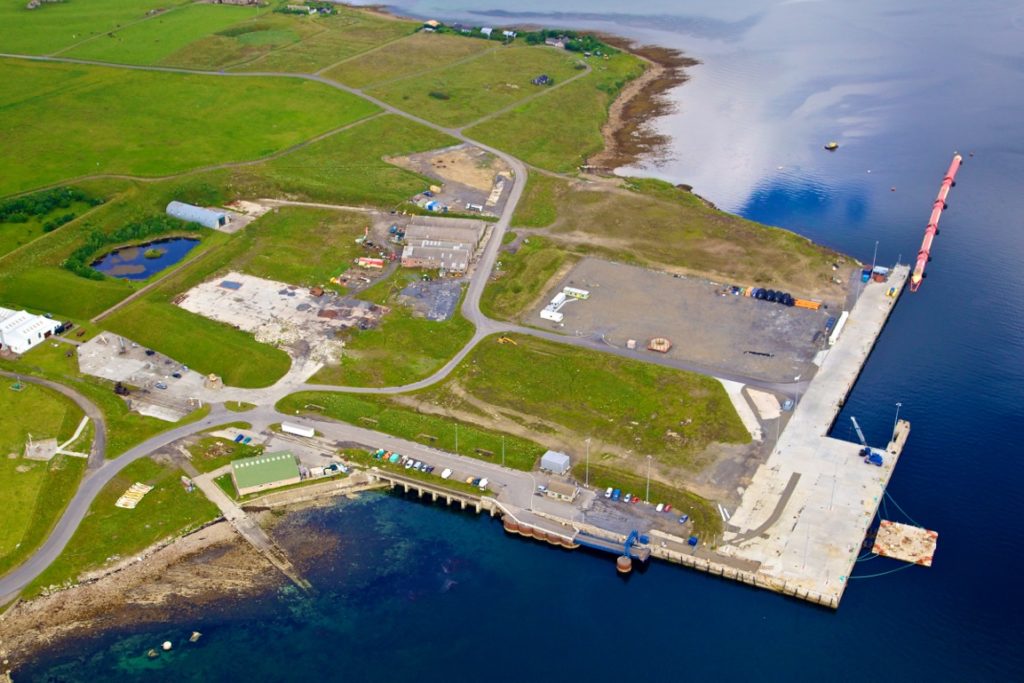
Orkney Council is facing a bill of up to £384,000 to clean up an oil spill caused by the navy decades ago at Lyness port.
The local authority wants to redevelop Lyness, on the island of Hoy, to take advantage of increased activity in oil and gas decommissioning.
However, before that can be done, it faces a £384,000 bill to extract heavy oil trapped below the site from when it was used as a Royal Navy fuel depot.
The contamination occurred due to a pipe spillage in the 1960s, when the site was owned and occupied by the Ministry of Defence (MoD).
Orkney council took over ownership of Lyness Harbour Area in 1977, aware of the historic contamination issue.
Gavin Barr, infrastructure director at the council, conceded this would make attempts to persuade the UK Government to step in would be “challenging”.
Despite this, the local authority is considering putting in a request to the Ministry of Defence to meet the “not inconsiderable” cost.
Councillor David Dawson, on the harbour board sub-committee, believes the government should do its part to help.
He said: “It is easy with the benefit of hindsight to argue that the then administration ought to have pursued the issue of the pollution more vigorously but, then again, awareness of environmental issues did not exist quite so acutely then as today.
“Given interest shown in the site by potential developers, it was considered prudent to look to progressing the remediation work, although the overall cost is not inconsiderable.
“I felt quite strongly that Orkney Islands Council should not necessarily bear the entire financial burden and that, despite the passage of time – and the circumstances of the 1977 purchase of the site – the MoD should, in the first instance be approached with a view to seeking some appropriate level of financial support.”
Environmental legislation states the causer of pollution or contamination is held responsible by regulators.
However, council officers said, in this case, it is likely the local authority will have been deemed to have acquired the land, after a period as a lease holder, in the knowledge of the contamination.
Accordingly there is no guarantee that attempts to persuade the UK Government to help meet the costs would be successful.
Councillors will decide next month whether to put in a formal request.
A number of “international industrial investors” have approached Orkney council about Lyness being a potential decommissioning facility, despite DSM Demolition earlier this year “scaling back” on a project which was first announced in 2016.
The remediation work needs to be carried out before any development, and not to do so would be “to close the door to future development”, according to Mr Dawson.
The council believes there is huge economic opportunity for Lyness in terms of decommissioning work due to its geographic position.
It is located within Scapa Flow, one of Europe’s largest natural harbours, which sits between the North Sea and North Atlantic which makes it an “ideal” site for energy-related activities.
Orkney council leader, James Stockan, is optimistic about its future.
He said: “DSM have pulled back, and we were disappointed by that, but there are quite a number of other people that have been looking.
“Something should be done at some point, Lyness is one of the best assets around that’s unused.
“It would carry out decommissioning for waters in the North Sea and west of Orkney.
“Scapa Flow is in an incredibly strategic position to reduce the amount of travel time required for decommissioning assets. For it not to be used would be a waste of resources.”
